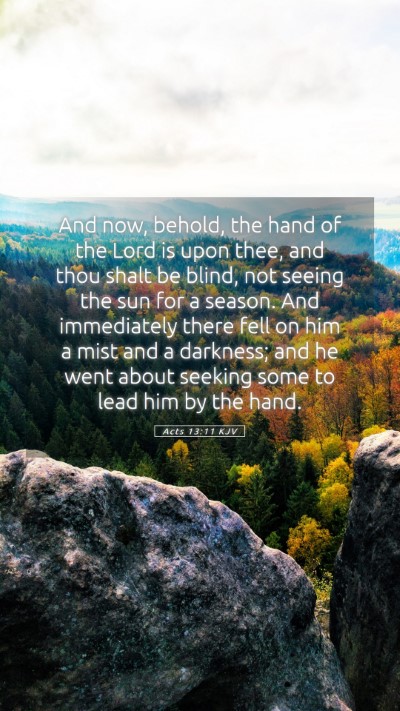Understanding Acts 13:11 - Bible Verse Interpretation
Acts 13:11 states: 'And now, behold, the hand of the Lord is upon thee, and thou shalt be blind, not seeing the sun for a season.' And immediately there fell on him a mist and a darkness; and he went about seeking some to lead him by the hand.
This passage occurs during Paul's first missionary journey, where he confronts Elymas the sorcerer who opposed the preaching of the Gospel. The verse presents a dramatic moment of divine judgment and serves as a powerful narrative demonstrating the authority of God over falsehood.
Bible Verse Meanings and Explanations
-
The Divine Authority:
According to Matthew Henry, this event illustrates God's sovereignty and the power of His word. The phrase “the hand of the Lord is upon thee” signifies that God's judgment is imminent.
-
Spiritual Blindness:
Albert Barnes notes that Elymas represents those who are spiritually blind, and his physical blindness serves as an emblematic judgment for leading others away from the truth.
-
The Role of Apostolic Power:
Adam Clarke emphasizes that this act showcases the authority bestowed upon the apostles to perform miracles and enact judgment as instruments of God’s will against false teachings.
In-Depth Analysis
The blindness inflicted upon Elymas serves multiple functions in the text:
-
Judgment on Sin:
This reflects the serious consequence of oppressing the work of the Holy Spirit. As Matthew Henry elaborates, it serves to confirm Paul's authority and the truth of the message he preaches.
-
Symbolism of Light and Darkness:
The contrast between blindness and sight symbolizes the struggle between spiritual light and darkness—a recurring theme in Scripture (John 8:12).
-
Invitation for Repentance:
This act of divine intervention calls Elymas, and those who witness it, to reflect on their spiritual state and encourages repentance, inherent in Acts 3:19.
Connecting Acts 13:11 to Other Scriptures
This verse can also be cross-referenced with:
- John 9:39: Jesus speaks of coming to the world to bring judgment, that those who do not see may see.
- 2 Corinthians 4:4: The god of this world blinds the minds of unbelievers.
- Acts 8:9-11: Another sorcerer, Simon, also demonstrates the theme of deceit and the ultimate truth of the Gospel.
Application of Acts 13:11 in Daily Life
Understanding Acts 13:11 encourages believers to reflect on their own lives:
-
The Importance of Spiritual Discernment:
As Elymas opposed the truth, we are reminded to be aware of false teachings and remain steadfast in our pursuit of the truth (1 John 4:1).
-
Embracing the Light:
Believers are called to walk in the light, reflecting Christ's teachings in their lives and helping others see the truth (Matthew 5:14-16).
-
Responding to Spiritual Blindness:
We should also examine where we may be blind to God's leading and seek His guidance with humility and prayer (James 1:5).
Conclusion
The account in Acts 13:11 serves as a profound reminder of the conflicts between truth and deception, light and darkness. Through the commentary of esteemed scholars like Henry, Barnes, and Clarke, one gains insight into God's power and the ultimate victory of His word in the realm of human affairs. In our personal Bible study, this passage calls us to engage deeply with Scripture, seeking clarity and wisdom in the face of challenges to the Gospel.


